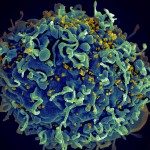Our laboratory uses the advantageous properties of a vector derived from the live vaccine against measles (RNA virus) to develop a portfolio of therapeutic candidates in two strategic areas with high medical needs:
- Immunotherapy of aggressive solid tumors (cancer of the triple negative breast, colorectal cancer, pleural mesothelioma, invasive bladder cancer)
- Prevention of several endemic infectious diseases classified in the WHO high-priority list.
In both cases, the use of a harmless and highly immunogenic RNA virus vaccine strain makes it possible to consider new types of treatments that are safer and more effective. The priority and the most advanced program is the MVdeltaC candidate, the first anticancer application from the Institut Pasteur-Oncovita Joint Laboratory. We have shown that replication of this virus in cancer cells produces large quantities of defective viral genomes that are potent agonists of the innate immunity receptor RIG-I. Their binding rapidly triggers apoptosis and activates the expression of type I IFNs and other proinflammatory cytokines. This property is of capital importance for the effectiveness of anticancer treatment. The laboratory is also evaluating anti-infectious vaccine viruses intended for combined immunization against measles and other diseases. The measles vaccine virus is a pediatric vaccine. We aim to produce simple and inexpensive vaccine candidates that make it possible to replace mixtures of several vaccines with a single one, thus greatly facilitating industrial production, particularly in countries in the South where vaccine production is still underdeveloped.
Research of the Institut Pasteur-Oncovita Joint Laboratory is further developed industrially by the Oncovita company (www.oncovita.fr)








